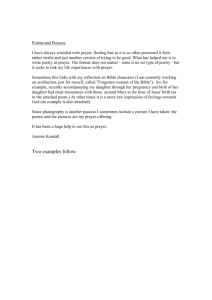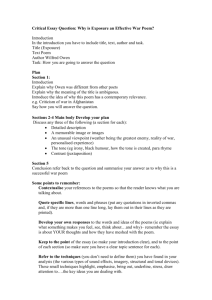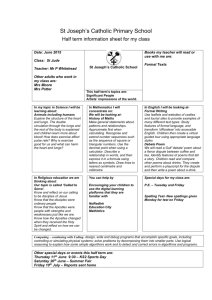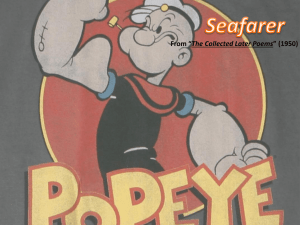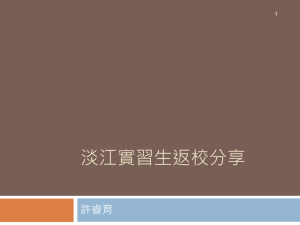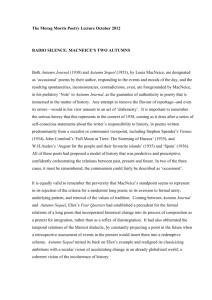In the poems War Photographer and Prayer
advertisement
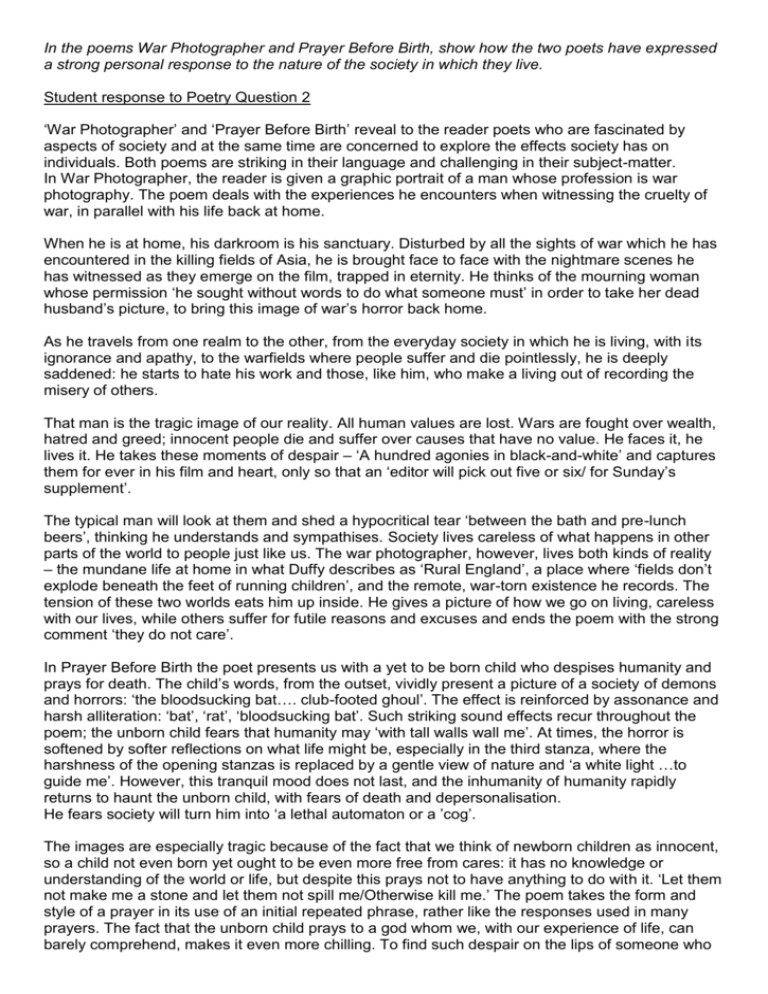
In the poems War Photographer and Prayer Before Birth, show how the two poets have expressed a strong personal response to the nature of the society in which they live. Student response to Poetry Question 2 ‘War Photographer’ and ‘Prayer Before Birth’ reveal to the reader poets who are fascinated by aspects of society and at the same time are concerned to explore the effects society has on individuals. Both poems are striking in their language and challenging in their subject-matter. In War Photographer, the reader is given a graphic portrait of a man whose profession is war photography. The poem deals with the experiences he encounters when witnessing the cruelty of war, in parallel with his life back at home. When he is at home, his darkroom is his sanctuary. Disturbed by all the sights of war which he has encountered in the killing fields of Asia, he is brought face to face with the nightmare scenes he has witnessed as they emerge on the film, trapped in eternity. He thinks of the mourning woman whose permission ‘he sought without words to do what someone must’ in order to take her dead husband’s picture, to bring this image of war’s horror back home. As he travels from one realm to the other, from the everyday society in which he is living, with its ignorance and apathy, to the warfields where people suffer and die pointlessly, he is deeply saddened: he starts to hate his work and those, like him, who make a living out of recording the misery of others. That man is the tragic image of our reality. All human values are lost. Wars are fought over wealth, hatred and greed; innocent people die and suffer over causes that have no value. He faces it, he lives it. He takes these moments of despair – ‘A hundred agonies in black-and-white’ and captures them for ever in his film and heart, only so that an ‘editor will pick out five or six/ for Sunday’s supplement’. The typical man will look at them and shed a hypocritical tear ‘between the bath and pre-lunch beers’, thinking he understands and sympathises. Society lives careless of what happens in other parts of the world to people just like us. The war photographer, however, lives both kinds of reality – the mundane life at home in what Duffy describes as ‘Rural England’, a place where ‘fields don’t explode beneath the feet of running children’, and the remote, war-torn existence he records. The tension of these two worlds eats him up inside. He gives a picture of how we go on living, careless with our lives, while others suffer for futile reasons and excuses and ends the poem with the strong comment ‘they do not care’. In Prayer Before Birth the poet presents us with a yet to be born child who despises humanity and prays for death. The child’s words, from the outset, vividly present a picture of a society of demons and horrors: ‘the bloodsucking bat…. club-footed ghoul’. The effect is reinforced by assonance and harsh alliteration: ‘bat’, ‘rat’, ‘bloodsucking bat’. Such striking sound effects recur throughout the poem; the unborn child fears that humanity may ‘with tall walls wall me’. At times, the horror is softened by softer reflections on what life might be, especially in the third stanza, where the harshness of the opening stanzas is replaced by a gentle view of nature and ‘a white light …to guide me’. However, this tranquil mood does not last, and the inhumanity of humanity rapidly returns to haunt the unborn child, with fears of death and depersonalisation. He fears society will turn him into ‘a lethal automaton or a ’cog’. The images are especially tragic because of the fact that we think of newborn children as innocent, so a child not even born yet ought to be even more free from cares: it has no knowledge or understanding of the world or life, but despite this prays not to have anything to do with it. ‘Let them not make me a stone and let them not spill me/Otherwise kill me.’ The poem takes the form and style of a prayer in its use of an initial repeated phrase, rather like the responses used in many prayers. The fact that the unborn child prays to a god whom we, with our experience of life, can barely comprehend, makes it even more chilling. To find such despair on the lips of someone who has not lived highlights emphatically the deep flaws in society which MacNeice feels. The human race, he shows, is one of sin and cruelty, and the pure words of a soul not yet delivered into this world tell the truth with a frightening and disturbing honesty. The two poems are profoundly unsettling in their imagery. They set out to present a strong contrast between a peaceful and simple society and one which is full of horrors: MacNeice’s ghouls are matched by Duffy’s ‘half-formed ghost’. Both paint dark scenes where life becomes unbearable. Death is never far from the surface, and the settings with their religious imagery and intense feelings highlight the fears of what society is becoming. Examiner’s comments This is a clear grade A answer, because of the quality of the interpretation and insight. The student has seen into the poems in a convincing way and made some very apt comparisons, linking them together effectively. It could still have been improved, however, and although quotations are used in a number of places to good effect, there is some of the writing where the comments seem rather too general because the examples are not given. With a few more telling quotations, this could well have been a grade A* response.



